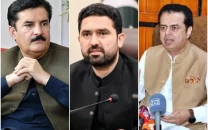Policing in Punjab suffers amid tussle with Centre
Officials say deadlock over the transfer of high-ups creating problems for IGP

There is a deadlock between the Centre and Punjab government over the transfer of police officials, compounding troubles for the head of the force in overcoming the growing crime rate in the province.
The province’s inspector general of police has only eight additional IGs – who are of grade-21 – to formulate policies with even though there are 10 more seats lying vacant.
Police officers said the lack of high-ups was affecting the training, accountability, as well as the affairs in the field.
They added that there was a shortage of officials, who were supposed to lead the force on a district level, by 60%.
Besides, there are only 40 senior superintendents of police (SSPs) despite the empty slots for 93 of them.
The officials said in more than 18 districts of the province, junior officers had been appointed because of the shortage of high-ups.
They pointed out that there were 48 officers for the 42 seats of deputy inspectors general (DIGs), adding that the additional officials could not be sent back to the federation because of the tussle between the Centre and Punjab governments.
Punjab is in a constitutional crisis at the moment.
Though the Lahore High Court’s recent order has provided an opportunity to all sides to review their political agendas, the ongoing political turmoil seems to be far from over. Punjab’s ruling parties, the PTI and PML-Q, wish to dissolve the assembly to force snap polls in the country.
Read more: Over a dozen Punjab Police officers reshuffled
In response, the ruling alliance at the Centre is simultaneously throwing a gauntlet to the rulers in Punjab to go ahead with its plan while carrying out all efforts to stop the assembly from being dissolved.
The country, especially Punjab, has been embroiled in a political and constitutional crisis since November 26 when PTI chief Imran Khan announced at a public gathering that the Punjab and Khyber-Pakhtunkhwa assemblies would be dissolved in the coming days.
Initially, the government side said that it would go to any limit to stop the dissolution from happening but then shifted gears and started challenging the PTI to go ahead with the plan, announcing that elections would be held in two provinces in case the party really went for it.
The PTI leadership too delayed the plan for the dissolution of the assemblies for weeks as the PTI chief continued to meet with party members and lawmakers to finalise the plan.
Fast forward to December 17, Imran, while sitting along with chief ministers of Punjab and K-P, announced that the assemblies would be dissolved on December 23.
He did not elaborate on why he delayed the decision for another week when the parties had reached the decision that assemblies would surely be dissolved.
When the opponents and people started questioning the unusual delay, PTI leader Fawad Chaudhry was quick to incorporate that one week’s time was sought for finalising the strategy for the verification of the resignations of PTI MNAs pending in the National Assembly since April this year.
With the announcement of dissolving the assemblies and conveying that the party legislators were finally ready to appear before the NA speaker after a delay of eight months, the PTI leadership thought that soon it would achieve its target of forcing general elections in the country and its winning streak would help it win if not sweep the elections.
However, the ruling alliance in the Centre, being the opposition in the Punjab Assembly, threw a spanner in the works.
On one hand, it submitted a no-confidence motion against Punjab Chief Minister Chaudhry Parvez Elahi to the speaker and the deputy speaker of Punjab Assembly and, on the other, Punjab Governor Baligur Rehman directed the CM to take a vote of confidence from the assembly on December 21.
The PTI and PML-Q defied the order and defused the move through a ruling of Punjab Assembly speaker, who declared the governor’s direction was against the assembly rules as well as the Constitution.
In return, the governor ruled the speaker’s ruling unconstitutional and de-notified the Punjab CM for failing to take a vote of confidence from the provincial assembly on December 21 on his order.
The governor’s de-notification order was swiftly challenged before the LHC, which restored Elahi as the Punjab CM after taking an undertaking from him that he would not send a summary for the dissolution of the assembly to the governor before the next date of hearing -- January 11.



















COMMENTS
Comments are moderated and generally will be posted if they are on-topic and not abusive.
For more information, please see our Comments FAQ